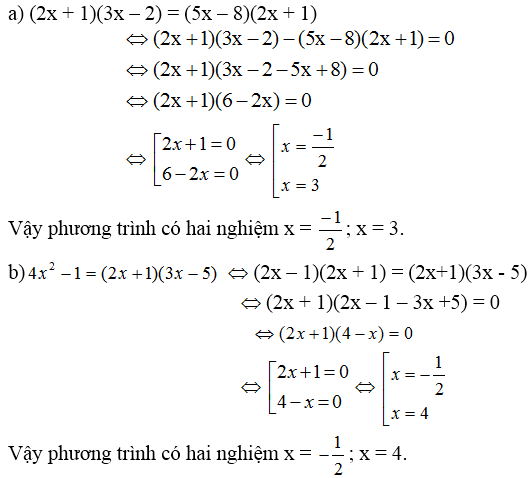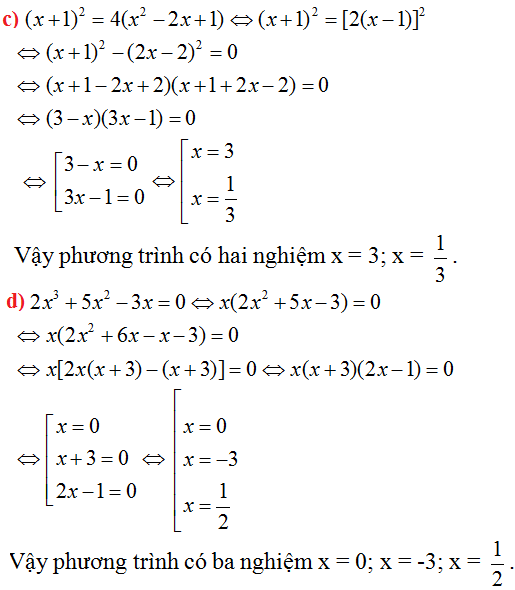
Hãy nhập câu hỏi của bạn vào đây, nếu là tài khoản VIP, bạn sẽ được ưu tiên trả lời.


a, Xét x=0 không phải nghiệm pt chia 2 vế cho x2 , đặt t= x+1/x từ đó suy ra phương trình ẩn t, giải ra ta được các phương trình ẩn x rồi ra x.
b, Tách đa thức thành tích của đơn thức (x+1) và 1 đa thức bậc 4 rồi làm như câu a,.
\(2x^4+3x^3-x^2+3x+2=0\)
\(\Leftrightarrow2x^4+4x^3-x^3-2x^2+x^2+2x+x+2=0\)
\(\Leftrightarrow2x^3.\left(x+2\right)-x^2.\left(x+2\right)+x.\left(x+2\right)+\left(x+2\right)=0\)
\(\Leftrightarrow\left(x+2\right).\left(2x^3-x^2+x+1\right)=0\)
\(\Leftrightarrow\left(x+2\right).\left(2x^3+x^2-2x^2-x+2x+1\right)=0\)
\(\Leftrightarrow\left(x+2\right).\left(2x+1\right).\left(x^2-x+1\right)=0\)
\(\Leftrightarrow\orbr{\begin{cases}x+2=0\\2x+1=0\end{cases}\Rightarrow\orbr{\begin{cases}x=-2\\x=-\frac{1}{2}\end{cases}}}\)
\(\text{Vì }x^2-x+1=x^2-x+\frac{1}{4}+\frac{3}{4}=\left(x-\frac{1}{2}\right)^2+\frac{3}{4}\ge\frac{3}{4}\)
Vậy phương trình có nghiệm \(S=\left\{-2,-\frac{1}{2}\right\}\)

Pt có 2 nghiệm x1=-0,2144506807,x2=-0,3927746596+1,475556329i (số phức)

a) Khai triển bình phương ròii giải như bình thường
b) <=>(x+2)(x2-2x+1)=0
sau đó tiếp tục giải phương trình tích là ra
c) <=>x (2x2-5x-7)=0
<=> x=0
hoặc 2x2-5x-7=0
bn đọc tự giải^^
#hoctốt
#plsss...k☺

(x2 + x + 1)(6 - 2x) = 0
<=> 6 - 2x = 0 (do x2 + x + 1 > 0)
<=> 2x = 6
<=> x = 3
Vậy S = {3}
(8x - 4)(x2 + 2x + 2) = 0
<=> 8x - 4 = 0 (vì x2 + 2x + 2 > 0)
<=> 8x = 4
<=> x = 1/2
Vậy S = {1/2}
x3 - 7x + 6 = 0
<=> x3 - x - 6x + 6 = 0
<=> x(x2 - 1) - 6(x - 1) = 0
<=> x(x - 1)(x + 1) - 6(x - 1) = 0
<=> (x2 + x - 6)(x - 1) = 0
<=> (x2 + 3x - 2x - 6)(x - 1) = 0
<=> (x + 3)(x - 2)(x - 1) = 0
<=> x + 3 = 0
hoặc x - 2 = 0
hoặc x - 1 = 0
<=> x = -3
hoặc x = 2
hoặc x = 1
Vậy S = {-3; 1; 2}
x5 - 5x3 + 4x = 0
<=> x(x4 - 5x2 + 4) = 0
<=> x(x4 - x2 - 4x2 + 4) = 0
<=> x[x2(x2 - 1) - 4(x2 - 1)] = 0
<=> x(x - 2)(x + 2)(x - 1)(x + 1) = 0
<=> x = 0 hoặc x - 2 = 0 hoặc x + 2 = 0 hoặc x - 1 = 0 hoặc x + 1 = 0
<=> x = 0 hoặc x = 2 hoặc x = -2 hoặc x = 1 hoặc x = -1
Vậy S = {-2; -1; 0; 1; 2}
+ Ta có: \(\left(x^2+x+1\right).\left(6-2x\right)=0\)
- Ta lại có: \(x^2+x+1=\left(x^2+x+\frac{1}{4}\right)+\frac{3}{4}=\left(x+\frac{1}{2}\right)^2+\frac{3}{4}\ge\frac{3}{4}>0\forall x\)
- Vì \(x^2+x+1>0\forall x\)mà \(\left(x^2+x+1\right).\left(6-2x\right)=0\)
\(\Rightarrow6-2x=0\Leftrightarrow-2x=-6\Leftrightarrow x=3\left(TM\right)\)
Vậy \(S=\left\{3\right\}\)
+ Ta có: \(\left(8x-4\right).\left(x^2+2x+2\right)=0\)
- Ta lại có: \(x^2+2x+2=\left(x^2+2x+1\right)+1=\left(x+1\right)^2+1\ge1>0\forall x\)
- Vì \(x^2+2x+2>0\forall x\)mà \(\left(8x-4\right).\left(x^2+2x+2\right)=0\)
\(\Rightarrow8x-4=0\Leftrightarrow8x=4\Leftrightarrow x=\frac{1}{2}\left(TM\right)\)
Vậy \(S=\left\{\frac{1}{2}\right\}\)
+ Ta có: \(x^3-7x+6=0\)
\(\Leftrightarrow\left(x^3-x^2\right)+\left(x^2-x\right)+\left(6x-6\right)=0\)
\(\Leftrightarrow\left(x-1\right).\left(x^2+x-6\right)=0\)
\(\Leftrightarrow\left(x-1\right).\left[\left(x^2-2x\right)+\left(3x-6\right)\right]=0\)
\(\Leftrightarrow\left(x-1\right).\left(x-2\right).\left(x+3\right)=0\)
Vậy \(S=\left\{-3;1;2\right\}\)
+ Ta có: \(x^5-5x^3+4x=0\)
\(\Leftrightarrow x.\left[\left(x^4-x^2\right)-\left(4x^2-4\right)\right]=0\)
\(\Leftrightarrow x.\left[x^2.\left(x^2-1\right)-4.\left(x^2-1\right)\right]=0\)
\(\Leftrightarrow x.\left(x^2-1\right).\left(x^2-4\right)=0\)
\(\Leftrightarrow x=0\left(TM\right)\)
hoặc \(x^2-1=0\Leftrightarrow x^2=1\Leftrightarrow x=\pm1\left(TM\right)\)
hoặc \(x^2-4=0\Leftrightarrow x^2=4\Leftrightarrow x=\pm2\left(TM\right)\)
Vậy \(S=\left\{-2;-1;0;1;2\right\}\)
!!@@# ^_^ Chúc bạn hok tốt ^_^#@@!!

a)(2x+1)(3x-2)=(5x-8)(2x+1)
⇔(2x+1)(3x-2)-(5x-8)(2x+1)=0
⇔(2x+1)(3x-2-5x+8)=0
⇔(2x+1)(-2x+6)=0
⇔2x+1=0 hoặc -2x+6=0
1.2x+1=0⇔2x=-1⇔x=-1/2
2.-2x+6=0⇔-2x=-6⇔x=3
phương trình có 2 nghiệm x=-1/2 và x=3

a, \(1-\frac{2x-1}{9}=3-\frac{3x-3}{12}\)
\(\Leftrightarrow\frac{108-12\cdot\left(2x-1\right)}{108}=\frac{108\cdot3-9\cdot\left(3x-3\right)}{108}\)
\(\Rightarrow108-12\cdot\left(x-1\right)=108\cdot3-9\cdot\left(3x-3\right)\)
\(\Leftrightarrow108-24x+12=324-27x+27\)
\(\Leftrightarrow3x=231\)
\(\Rightarrow x=77\)
c,\(\frac{3}{4x-20}+\frac{15}{50-2x^2}+\frac{7}{6x+30}=0\)
\(\Rightarrow3\cdot\left(50-2x^2\right)\cdot\left(6x+30\right)+15\cdot\left(4x-20\right)\cdot\left(6x+30\right)+7\cdot\left(4x-20\right)\cdot\left(50-2x^2\right)=0\)
\(\Leftrightarrow900x+4500-36x^3-180x^2+360x^2+1800x-1800x-9000+1400x-56x^3-7000+280x^2=0\)
\(\Leftrightarrow-92x^3+460x^2+2300x-11500=0\)
\(\Leftrightarrow92x^3-460x^2-2300x+11500=0\)
\(\Leftrightarrow\orbr{\begin{cases}x=-5\\x=5\end{cases}}\)
a) Thay x = 3 vào bất phương trình ta được: 2.3 + 3 < 9 <=> 9 < 9 (khẳng định sai)
Vậy x = 3 không là nghiệm của bất phương trình2x + 3 < 9
b) Thay x = 3 vào bất phương trình ta có: -4.3 > 2.3 + 5 => -12 > 11 (khẳng định sai)
Vậy x = 3 không là nghiệm của bất phương trình -4x > 2x + 5
c) Thay x = 3 vào bất phương trình ta có: 5 - 3 > 3.3 -12 => 2 > -3 (khẳng định đúng)
Vậy x = 3 là nghiệm của bất phương trình 5 - x > 3x - 12

\(2x^4-2x^2y+y^2-64=0.\)
\(x^4+x^4-2x^2y+y^2-64=0.\)
\(\left(x^4-2x^2y+y^2\right)+x^4-64=0.\)
\(\left(x^2-y\right)^2+x^4-64=0.\)
\(\left(x^2-y\right)^2+x^4=64.\)
Có \(\left(x^2-y\right)^2\ge0\)
mafk \(\left(x^2-y\right)^2+x^4=64.\)
\(\Rightarrow x^4\le64.\)
\(\Rightarrow x^2\le8\)
Từ đó xét tiếp



\(2x^3+5x^2-36=0\)
\(\Leftrightarrow2x^3+9x^2-4x^2+18x-18x-36=0\)
\(\Leftrightarrow\left(2x^3+9x^2+18x\right)-\left(4x^2+18x+36\right)=0\)
\(\Leftrightarrow x\left(2x^2+9x+18\right)-2\left(2x^2+9x+18\right)=0\)
\(\Leftrightarrow\left(x-2\right)\left(2x^2+9x+18\right)=0\)
\(TH1:x-2=0\Leftrightarrow x=2\)
\(TH2:2x^2+9x+18=0\)
Ta có: \(\Delta=9^2-4.2.18=-63< 0\)
Vậy TH2 ko có nghiệm
Vậy x = 2